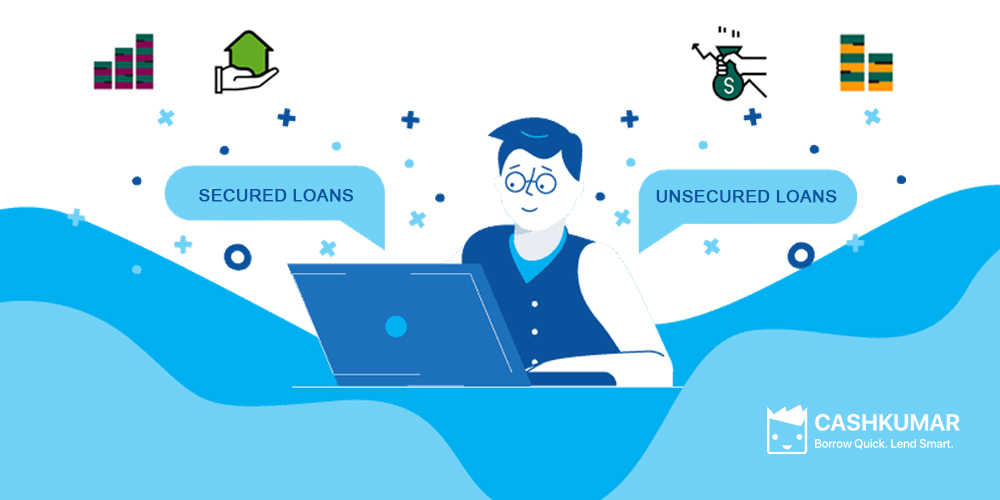 You may be wondering as to which type of loan should you opt for – secured or an unsecured loan. A secured loan requires you to offer a security or a collateral such as property, land, gold or even your vehicle to the loan issuing financial institution. On the other hand, an unsecured loan does not require pledging any collateral guarantee when the loan is issued by the financial institution to the borrower.
You may be wondering as to which type of loan should you opt for – secured or an unsecured loan. A secured loan requires you to offer a security or a collateral such as property, land, gold or even your vehicle to the loan issuing financial institution. On the other hand, an unsecured loan does not require pledging any collateral guarantee when the loan is issued by the financial institution to the borrower.
Types of secured loans include home loans, car loans, gold loans, loans against property, etc. Personal loans, credit cards loans, on the other hand, are examples of unsecured loans which are sanctioned by a bank or a non-banking financial institution in India by determining the applicant’s creditworthiness.
Let us look at the features of each type of loan – secured and unsecured:
Features of a secured loan:
Collateral: With a secured loan, the collateral ensures that the financial institution has a security in place to recover funds in case the borrower defaults. The way the financial institution recovers the debt or loan is by seizing the pledged collateral and then auctioning it off.
End use: A secured loan may have both restricted and flexible end uses depending on the type of loan issued. For example, a home or a car loan may only be used to purchase the vehicle or the home. Until the loan is fully repaid, the car or the home will be held as a collateral by the financial institution. On the other hand, if the loan has been sanctioned against gold or property, then end use for the borrower is flexible.
Eligibility: In order to make a secured loan application in any financial institution in India, the applicant must be at least 21 years of age at the time of filing the application. In addition to that, the applicant also needs to provide documentary evidence of a secure source of regular monthly income along with a positive credit history.
Process: Sanctioning a secured loan is a more time-consuming process and requires extensive documentation that is to be submitted along with the application to the financial institution. For example, in the case of a home loan, the documentation process is probably the most extensive as the legal department will check all the necessary paperwork. Then the applicant’s credit and personal issues will also have to be looked in to by the financial institution. The gold loan, on the other hand, is a much simpler process where the loan amount is disbursed within 24 to 48 hours of making the application if all the necessary paperwork is in order.
Interest rates: The interest rates for secured loans are lower in comparison to unsecured loans as the financial institution has a collateral pledged to safeguard the credit risk that it takes on the borrower. The interest paid on certain types of secured loans such as home loan is tax deductible for the borrower.
Loan Amount: The amount of loan sanctioned is usually a percentage of the asset value that has been put up as a collateral. In terms of home loans, it is usually 80% of the appraised value. However, the applicant may have to meet certain conditions that are applicable before the loan amount is disbursed.
Tenure: The repayment tenure for secured loans are medium to long-term, ranging from a few years to 20 years. However, the specifics will depend on the type of loan and the issuing financial institution.
Features of an unsecured loan:
Collateral: The most common type of unsecured loans provided by financial institutions in India are personal loans. These loans are multi-purpose in nature as it does not require pledging a security or collateral against it. Financial institutions will look at the applicant’s credit history, employment status, perform the necessary background checks before making a decision to approve or reject the loan.
End Use: With an unsecured loan, the end user is flexible. You may use it for multiple purposes such as wedding expenses, medical costs, home renovations, vacations or purchasing consumer durables.
Eligibility: Prior to making an application for an unsecured loan, the applicant should be 21 years of age. He or she needs to be salaried or self-employed with a regular monthly income and a good credit score.
Process: The documentation process for unsecured loans is so much simpler compared to secured loans. There are no legal approvals required as is the case with secured loans. Certain financial institutions can turn around an unsecured loan application within 24 hours and disburse the funds immediately if the applicant meets all the eligibility criteria.
Interest rate: An unsecured loan has higher interest rates in comparison to secured loans. Depending on your credit situation, interest rates may go up as high as 30% per annum. In case the borrower defaults on the loan, the penalties and other charges too are way higher.
Loan amount: The range of unsecured loans is definitely less starting from thousands and going up to a maximum of 20 lakhs. However, the amount is totally dependent on the applicant’s income history, loan requirement, employment status, credit score, and the financial institution’s lending policies.
Tenure: Usually unsecured loans have a much shorter repayment tenure. It can range from 60 days up to 5 years at the most.
There are pros and cons for both types of loans. Depending on your requirement, you need to decide which loan product is more suitable for your needs. Here are the key differentiators that can help you decide:
Key Differentiators – Secured vs Unsecured Loans:
- The primary differentiator between these two types of loans is the requirement for a collateral in order to get the loan sanctioned. While a secured loan requires the applicant to pledge an asset to the lender, the unsecured loan does not need a security for the lender to approve the loan.
- The rate of interest between secured and unsecured loans are different. Secured loans have low rates of interest whereas unsecured loans have a much higher rate of interest as they are more of a risk since there is no safeguard for the lender in case the borrower defaults.
- Secured loans require extensive documentation but are easier to get sanctioned. Unsecured loans have a simpler process but are more difficult to attain as financial institutions consider them to be a riskier proposition compared to secured loans.
- The repayment tenure for secured loans is longer in comparison to unsecured loans.
Is a Secured Loan Better than an Unsecured Loan?
From the perspective of the financial institution, a secured loan is a much better alternative to unsecured loans. However, from the point of view of the borrower, his requirement and availability of a collateral will determine the type of loan that is a better option. But secured loans do have a longer repayment period, lower rates of interest, some of which may be tax deductible. Thus, a secured loan may prove to be a better choice to unsecured loans in the long run for the borrower too.
Send comments and suggestions to support@cashkumar.com



